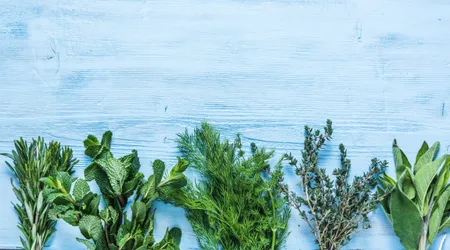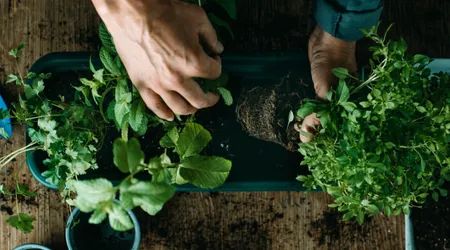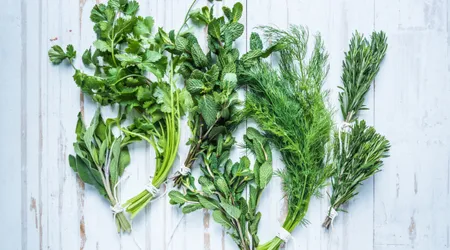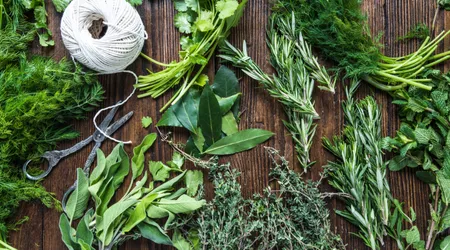How to Preserve Aromatic Herbs

Preserving Aromatic Herbs: Aromatic herbs are the pulsating heart of many cuisines, from Mediterranean to exotic.
Announcements
Basil, parsley, rosemary, thyme: these ingredients transform a simple dish into a sensory experience.
However, their freshness is fleeting, and without the right techniques, preserving herbs can become a challenge.
Why let their aroma fade, when there are clever ways to preserve them?
Preserving Aromatic Herbs

This guide explores creative and practical approaches to keeping herbs fresh in flavor and aroma, with solutions to suit every lifestyle.
Announcements
It's not just about prolonging the life of herbs, but about enhancing their potential in the kitchen.
Preserving herbs is no easy task: it requires strategy, knowledge, and a pinch of creativity.
Using traditional and innovative methods, this guide will help you discover how to transform a bunch of herbs into a lasting ally for your dishes.
Get ready to explore techniques, practical examples, and tips that will make conservation an accessible art.
Finally, we will address common myths and frequent doubts, offering clarity and concrete solutions.
++ Italian Soffritto: Techniques, Secrets, and Tradition in the Kitchen
With 651 TP3T of Italian families regularly using aromatic herbs in their cooking (ISTAT 2023 data), knowing how to preserve them is more important than ever. Find out how to make a difference, one sprig at a time.
Why Preserving Herbs Is an Art Worth Learning

Storing herbs is like guarding a volatile treasure: their aroma is precious, but can quickly fade if not treated with care.
The challenge is to preserve not only the freshness, but also the organoleptic properties that make each herb unique.
For example, basil loses its vibrant aroma if stored incorrectly, while rosemary can maintain its intensity for months with the right approach.
Understanding the nature of each herb is the first step to effective conservation.
++ Perfect Risotto Cooking: The Art of Preparing an Italian Classic
Furthermore, smart storage reduces food waste, an increasingly pressing issue.
Herbs, often purchased in large bunches, risk rotting in the refrigerator if not used promptly.
By adopting techniques such as drying or freezing, you can extend their useful life, saving money and respecting the environment.
Think of preserving herbs as an investment: the time spent today translates into tasty dishes tomorrow.
Ultimately, mastering this practice allows you to personalize your kitchen.
Imagine having an arsenal of ready-to-use flavors at your disposal, without having to run to the supermarket.
Whether it's a homemade pesto or an infusion for a roast, well-preserved herbs elevate any recipe.
Isn't it time to transform your approach to cooking with a more conscious method?
| Aromatic Herb | Fresh Duration (Refrigerator) | Ideal Preservation Method |
|---|---|---|
| Basil | 5-7 days | In the water like a bouquet |
| Parsley | 10-14 days | Wrapped in a damp cloth |
| Rosemary | 2-3 weeks | Drying or freezing |
| Thyme | 10-14 days | Freezing in oil |
Traditional Methods for Preserving Aromatic Herbs

One of the oldest methods of preserving aromatic herbs is drying, a technique that concentrates the flavor and extends the shelf life.
By hanging bunches of rosemary or sage in a dry, ventilated place, you can obtain a product that can last up to a year.
However, drying requires patience and care: excessive humidity can cause mold, ruining your efforts.
For this reason, choose a corner of the house away from sources of steam, such as the kitchen.
Another traditional approach is preserving in oil or vinegar.
This method not only preserves the herbs, but also creates a flavorful seasoning.
For example, soaking sprigs of thyme in extra virgin olive oil produces a fragrant oil perfect for salads or marinades.
++ Techniques for Perfect Frying
The key is to use sterilized containers to avoid contamination. Furthermore, this method is ideal for those who love to experiment in the kitchen, turning preservation into a creative act.
Finally, don't underestimate the simplicity of the refrigerator.
Wrapping herbs in a damp cloth or storing them in an airtight container can prolong their freshness.
For example, parsley stays crunchy for weeks if wrapped in a slightly damp cloth.
These methods, although simple, require a routine: regularly checking the condition of the herbs avoids unpleasant surprises.
With a little discipline, your refrigerator can become an ally in the fight against waste.
Original Example 1: Creative Drying of Rosemary
Imagine turning your rosemary into a decorative and functional culinary ally.
Gather fresh sprigs, tie them with natural twine, and hang them upside down in a well-ventilated room.
For an aesthetic touch, weave the sprigs with dried flowers, creating an ornamental bouquet.
After two weeks, the rosemary will be ready to be crumbled and stored in glass jars.
Use it to flavor baked potatoes or for a relaxing infusion: the scent will surprise you.
Modern Innovations for Preserving Aromatic Herbs
In the age of technology, preserving herbs can go beyond traditional methods.
Freezing is a modern solution that preserves fresh flavor without sacrificing nutrients.
For example, finely chopping basil and freezing it in ice cubes with a splash of water creates ready-to-use portions for sauces or soups.
This method is particularly useful for those who have little time but want to maintain the quality of the herbs.
Another innovation is the use of home dryers, tools that ensure uniform dehydration.
Unlike air drying, dehydrators control temperature and humidity, reducing the risk of spoilage.
Plus, they're versatile: you can dry not only herbs, but also fruits and vegetables.
Investing in a dehydrator may seem like a luxury, but for cooking enthusiasts, it's a game-changer.
Finally, vacuum packing is gaining popularity.
Using special bags and a vacuum sealer, you can seal fresh herbs, slowing down oxidation.
This method is ideal for delicate herbs like cilantro, which tend to spoil quickly.
While it requires an initial investment, sous vide allows you to plan your meals precisely, reducing waste and maximizing flavor.
| Modern Method | Advantages | Disadvantages |
|---|---|---|
| Freezing | Preserves fresh flavor, easy | Requires freezer space |
| Dryer | Precise control, consistent results | Initial cost of the device |
| Vacuum packed | Long lasting, minimal deterioration | Requires specific equipment |
Original Example 2: Vacuum-Packed Coriander Cubes
For an exotic touch, try vacuum-packing your cilantro in cubes.
Chop the fresh leaves, mix them with a spoonful of coconut oil and pour them into an ice cube tray.
Freeze the cubes, then transfer them to a vacuum-sealed bag.
These cubes are perfect for curries or Asian dishes – just drop one into the pan for a burst of flavour.
This method combines practicality and innovation, making each dish a unique experience.
The Conservation Analogy: Herbs as an Orchestra
Preserving herbs is like conducting an orchestra: each herb is an instrument with its own unique timbre, and your job is to harmonize them to create a symphony of flavors.
Basil, with its lively notes, requires delicate storage like a light flute.
Rosemary, as robust as a double bass, lends itself to more intense methods such as drying.
If just one instrument is out of tune, the entire melody suffers.
Likewise, choosing the wrong method for an herb can compromise its flavor, ruining the final dish. Manage carefully, and your kitchen will resonate with perfect harmonies.
This analogy highlights the importance of knowing the specifics of each herb.
Not all plants respond well to the same methods: parsley loves humidity, while sage thrives in dryness.
Experimenting with different techniques allows you to refine your culinary “ear,” finding the perfect balance between practicality and flavor.
Also, like a conductor trying out new compositions, don't be afraid to innovate.
Mix traditional and modern methods, create unique combinations and discover what works best for you.
Preservation is not just a necessity, but an opportunity to express your creativity in the kitchen.
Frequently Asked Questions about Storing Herbs
| Request | Answer |
|---|---|
| Can I freeze all herbs? | Yes, but delicate herbs like basil require specific techniques, such as freezing in oil. |
| Does drying alter the flavor of herbs? | It can intensify the aroma, but improper drying can reduce it. Use low temperatures. |
| How long do vacuum-packed herbs last? | Up to 6 months, if stored properly in a cool, dry place. |
| Is it better to store herbs fresh or dried? | It depends on the use: fresh for raw dishes, dried for long cooking. |
| Can I reuse flavored oil? | Yes, but consume it within 1-2 months and store it in the refrigerator to be safe. |
Practical Advice for Guaranteed Success
To get the most out of canning, start with high-quality herbs.
Choose fresh bunches, with lively leaves and no signs of wilting.
Also, wash herbs only when necessary, as excessive moisture accelerates spoilage.
A little-known trick is to use a salad bowl to gently spin the herbs after washing: dry and ready for storage.
Another tip is to plan according to your consumption.
If you often use small amounts of herbs, opt for freezing them in portions.
If you prefer intense flavors for stews or roasts, drying is the best choice.
In any case, always label the containers with the storage date: even well-preserved herbs have a limited shelf life.
Finally, experiment with combinations.
Mix different herbs in a single jar of oil or create dried blends for custom seasonings.
This not only makes canning more fun, but it allows you to have unique flavors on hand for every occasion.
Preserving herbs is not just a matter of convenience, but a way to celebrate nature's richness.
Conclusion: Turn Conservation into an Opportunity
Preserving herbs is much more than a necessity: it's an art that combines tradition, innovation, and creativity.
With the right methods, you can transform a bunch of herbs into a versatile ingredient, ready to elevate any dish.
Whether you choose drying for its rustic charm or freezing for its convenience, the important thing is to adapt the techniques to your lifestyle.
Don't let time steal the flavor from your herbs.
Experiment, try new methods and discover the pleasure of having fresh flavors at your fingertips all year round.
With a little care and strategy, preserving herbs will become an integral part of your passion for cooking.
Which technique will you try first?
